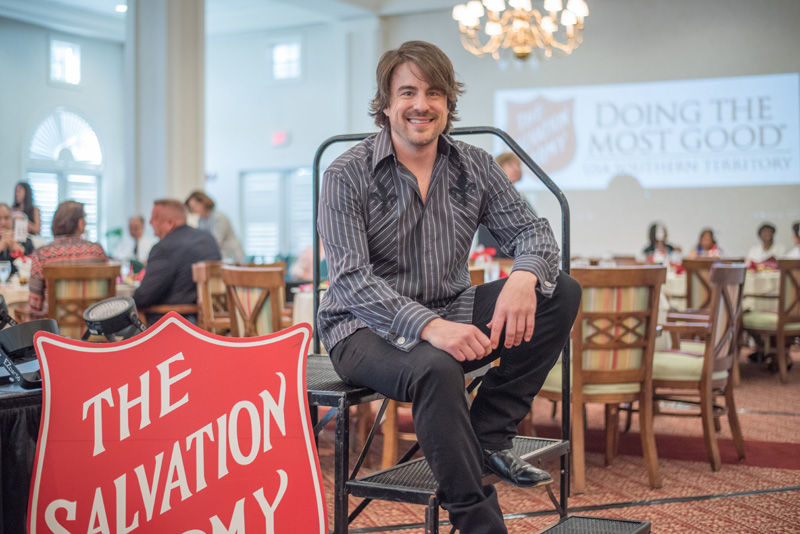Jimmy Wayne, a former foster child who struggled his way to the top of the country music charts as a singer and songwriter, was the keynote speaker and entertainment at the annual “Soap, Soup and Salvation” fundraising dinner last Saturday evening at the Oak Harbor Club House to benefit the Salvation Army of Indian River County.
Before enjoying a delicious Surf and Turf dinner, where guests sat around a stage listening to Wayne perform some of his chart-topping songs, the 300 guests enjoyed a cocktail hour while bidding on a number of silent-auction items, including three of Wayne’s autographed guitars.
Betty Skel-McNally came hoping to score more than just a signed guitar. She had brought along a white cowboy hat covered with the autographs of a dozen other country music stars such as Tim McGraw and Brantley Gilbert, to be auctioned off at an event for veterans suffering from PTSD.
“I have listened to his music and have a heartfelt connection with his story and what he has gone through,” said Skel-McNally, as she browsed the items with Christa Stone, the Treasure and Space Coast Radio 94.7 Hot Country DJ who would later introduce Wayne.
Wayne’s story is one of despair followed by triumph, as described in his book, “Walk to Beautiful,” a New York Times best-seller. He was raised by a single mother who went through a slew of “roommates” – drug addicts, abusers and dealers – while her children were left to fend for themselves.
Throughout his hellish youth and bouts in foster care the Salvation Army was one of the good things he could count on. As an adult, he was inspired to write a song called “Paper Angels” about the Salvation Army’s Christmastime Angel Tree program, which eventually became a book and a made-for-TV movie.
“Every year I was a recipient of the Angel Tree program from the time I was 8 until I was about 16,” said Wayne. “I got my first guitar through the program.”
His empathy for abused and neglected children has led him to fight to extend the age for teens who are aging out of the foster care system from 18 years old to 21, explaining, “I was in the system and when kids age out at 18 they need at least three more years to finish school and to make the transition to become productive citizens.”
“What’s interesting about him is that it just goes to show you that it’s not what you are given but it is what you do with what you have,” said Dr. Jill Jaynes.
“What he had was a willingness to work, which led him to his final foster home, a couple he mowed lawns for who eventually took him in permanently.”
The Salvation Army assists 30 million Americans with a vast array of social services including food, clothing, shelter and outreach programs.
“What I really like about the Salvation Army is that what they collect here stays local,” said Linda Hahka-Sansburn a volunteer bell-ringer. “And I love knowing that the majority of the money goes to help people and not to pay for administrative costs. When I ring the bell you have people come up and tell you stories about how the Salvation Army has helped them.”

